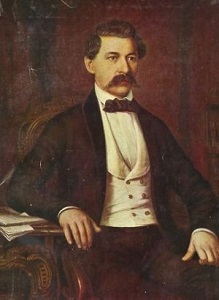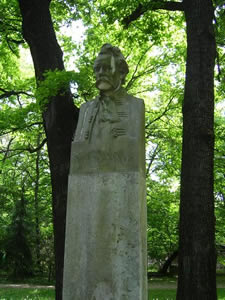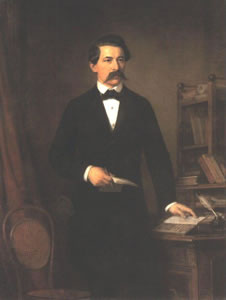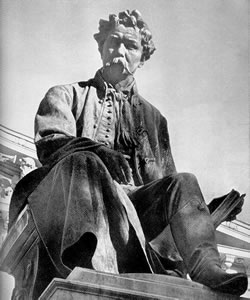De Nederlandse schrijver Godfried Bomans werd geboren in Den Haag op 2 maart 1913. Zie ook alle tags voor Godfried Bomans op dit blog.
Uit: Erik of Het klein insectenboek
“’Kom, kom, kom,’ sprak de worm, die zich nu werkelijk in de vreemdste bochten begon te kronkelen van ingenomenheid, ‘weest u toch niet beschaamd. Wij kunnen niet allemaal een worm zijn. Nu, wat is het?’ ‘Ik zou graag willen weten hoe u zich zo…’ Erik zocht naar het juiste woord om den worm niet te kwetsen, ‘zo opgeruimd kunt voelen, terwijl u toch eigenlijk – blind bent.’ ‘Ik kan mij uw verlegenheid van zo even wel begrijpen,’ sprak de worm, een hevigen kronkel makend, ‘de vraag is dom. Maar dat hindert niets, want van zijn domheden leert men. De zaak is dat u de rollen omdraait, mijn waarde. Het is juist een groot voorrecht om blind te zijn, een teken van uitverkiezing. Hoeveel dieren zijn er blind? Ik kan ze op mijn ringen natellen, zo weinig zijn het er. Wij, wormen, hebben geen ogen nodig. U wel. Dat is een teken van zwakte.(…) En zo praatte het dier voort, terwijl het zich van louter vergenoegdheid in steeds ingewikkelder bochten wrong.”

Godfried Bomans (2 maart 1913 – 22 december 1971)
Portret door Kees Verwey, 1953
De Nederlandse schrijver Multatuli (pseudoniem van Eduard Douwes Dekker) werd geboren in Amsterdam op 2 maart 1820. Zie ook alle tags voor Multatuli op dit blog.
Uit: De geschiedenis van Woutertje Pieterse
“Wouter liep, liep… en wist niet waarheen. Naar huis kon-i niet. Daar toch werd hy te streng bewaakt. Wat niet moeielyk viel, want de ruimte was bekrompen.
Hy koos eenzame straten, en kwam eindelyk aan ’n poort die hy zich herinnerde meer gezien te hebben. Maar den naam wist-i niet, en ik ook niet. ’t Was ’n platte lage poort in welks buurt het altyd zoo naar asch rook, en waar-i eens dien sprong had gedaan, toen hy met Fransje Halleman was weggebleven van de katechizatie, die meende dat Wouter niet durfde wegblyven en van de poort springen. Maar Wouter durfde wèl, en deed het, juist omdat Fransje Halleman getwyfeld had aan z’n durven.
Aan dat wegblyven had hy te danken dat-i zoo byzonder goed thuis was in Habakuk, wiens profetiën hy twaalfmaal moest afschryven tot straf. Die sprong bezorgde hem bovondien ’n barometer in z’n verstuikten grooten teen, die uit edele wraak hem later altyd waarschuwde als ’t regenen zou.
In zekeren zin was Habakuk te beschouwen als Wouter’s overgang van de kinderlektuur tot de boeken waarin van ‘groote menschen’ wordt verteld. Sedert eenigen tyd namelyk voelde hy zich geschokt in z’n eerbied voor brave Hendrikken, en hy walgde van de papieren perzikken der naarstigheid. Andere perzikken kende hy niet, omdat die zoo niet voorkomen in ’n burgerhuishouden.
Niets was natuurlyker dan dat-i vurig verlangde met z’n grootere makkers op de school te kunnen meespreken over de wonderen die er gebeuren in de werkelyke wereld, waar men in ’n koets rydt, steden verwoest, prinsessen trouwt, en ’s avonds opblyft na tienen, a
l is er niemand jarig. Ook bedient men zichzelf aan tafel in die wereld, en heeft maar te kiezen wat men gebruiken wil. Zoo meenen de kinderen.”
Multatuli (2 maart 1820 – 19 februari 1887)
Standbeeld in Amsterdam
De Amerikaanse schrijver en journalist Tom Wolfe werd geboren op 2 maart 1930 in Richmond, Virginia. Zie ook alle tags voor Thomas Wolfe op dit blog.
Uit: The Nanny Maffia
“Champagne for your little boy’s birthday party?
“You’re damned right,” she says. “For all the nannies. I’m not kidding! If we ever tried to give a party for Bobby and his little friends without champagne for the nannies, we might was well, you know, forget about it.
“Bobby’s nanny is mad enough as it is. All she can do is drop what are supposed to be very subtle hints about the V——’s party for little Sarah. Do you know what Van gave each kid as a party favor? An electric truck. I’m talking about a real electric truck. Of course, they’re nothing much really. They’re smaller than a Jaguar. By a little bit. The kid can get inside of it and drive it! They cost five hundred dollars, five hundred dollars! Can you imagine that? We had to carry the damn thing home. You should have seen us trying to get it in the cab. Of course, Van is absolutely petrified of the nannies.
“Well, I was damned if we were going to do anything like that. Robert had to take the whole afternoon off Tuesday to go to Schwarz. This was precisely the afternoon the Swedes came in with some bond thing, of course. The Swedes wear the worst clothes. They all look like striped cardboard. They think they’re very European. Anyway, Robert got some kind of bird with a tape recorder in it, I don’t know. The kids can talk into it and it records it and says it back. Something like that. You know. Well, I don’t care, I think it’s going to be a perfectly cute party favor, but our Mrs. G— is not going to be happy with it, I’m sure of that.”
Thom Wolfe (Richmond, 2 maart 1930)
De Amerikaanse schrijver John Irving werd geboren op 2 maart 1942 in Exeter, New Hampshire. Zie ook alle tags voor John Irving op dit blog.
Uit: The Lion Guy
“Imagine a young man on his way to a less-than-thirty-second event–the loss of his left hand, long before he reached middle age.
As a schoolboy, he was a promising student, a fair-minded and likable kid, without being terribly original. Those classmates who could remember the future hand recipient from his elementary-school days would never have described him as daring. Later, in high school, his success with girls notwithstanding, he was rarely a bold boy, certainly not a reckless one. While he was irrefutably good-looking, what his former girlfriends would recall as most appealing about him was that he deferred to them.
Throughout college, no one would have predicted that fame was his destiny. “He was so unchallenging,” an ex-girlfriend said.
Another young woman, who’d known him briefly in graduate school, agreed. “He didn’t have the confidence of someone who was going to do anything special” was how she put it.
He wore a perpetual but dismaying smile–the look of someone who knows he’s met you before but can’t recall the exact occasion. He might have been in the act of guessing whether the previous meeting was at a funeral or in a brothel, which would explain why, in his smile, there was an unsettling combination of grief and embarrassment.”

John Irving (Exeter, 2 maart 1942)
De Amerikaanse dichter en performer Michael Salinger werd geboren op 2 maart 1962 in Cleveland, Ohio. Hij begon met zijn optredens in het midden van de jaren tachtig bij bijeenkomsten als de Pearl Road Auto Wrecking Junkstock festivals. Vijf keer was hij coach en captain van het Cleveland Slam team bij de National Poetry Slam competitie. Zijn gedichten zijn verschenen in talrijke literaire tijdschriften. In 2004 verscheen de bundel They call it Fishing not Catching.
911
hate is extremely flammable
its vapors may cause flash fire
hate is harmful if inhaled
keep hate away from heat, sparks and flame
do not breath the vapors of hate
wash thoroughly after using hate
if you accidentally sallow hate
get medical attention
prejudice is an eye and skin irritant
its vapors too are harmful
do not get prejudice in eyes
or on clothing
prejudice is not recommended for use
by persons with heart conditions
if prejudice is swallowed induce vomiting
if prejudice comes in contact with skin
remove clothing and wash skin
if breathing is affected, get fresh air immediately
violence is harmful if absorbed through the skin
keep violence out of the reach of children
do not remain in enclosed areas
where violence is present
remove pets and birds from the vicinity of violence
cover aquariums to protect from violence
drift and run off from sites of violence
may be hazardous
this product is highly toxic
exposure to violence may cause
injury or death.
Michael Salinger (Cleveland, 2 maart 1962)
De Franse schrijver en letterkundige Pascal Rannou werd geboren op 2 maart 1958 in Laval. Hij doceert aan het Lycée Lavoisier de Mayenne en aan de universiteit van Rennes. Hij schrijft romans, essays, gedichten en kritieken en bijdragen aan o.a. Ar Men en Peuple Breton.
Uit: Noire la neige (2008)
“Chattanooga… Pitchipoï… Chattanooga… Pitchipoï… J’entends le bruit du train dans ma mémoire. Les pistons, les soupapes et les tuyaux de forge de la locomotive. Chattanooga… Pitchipoï… J’entends le bruit du train qui a rythmé ma vie. Et l’oeil de la locomotive illumine la nuit, traverse les collines, serpente autour des lacs. J’ai six ans. Penchée à la fenêtre, je respire les parfums de la nuit, l’été, dans la montagne. L’odeur des pins, des fleurs et des prairies, odeur de liberté. Ma’ passe une main dans mes cheveux crépus. «Il est temps de dormir, tes soeurs dorment déjà. Demain tu danseras, c’est promis. Tu montreras aux gens les pas que tu sais faire.» Chattanooga… Pitchipoï… Je repose la tête sur le bras de Ma’. Je me sens bien, la nuit. La nuit est noire, comme moi, on peut s’y réfugier, se confondre avec elle. La nuit est belle comme Ma’, qui est pourtant plus noire qu’elle, plus noire que moi. Chattanooga… Pitchipoï… J’entends le bruit du train qui m’emmène au pays de l’éternel hiver. Quand ils m’ont arrêtée, je n’ai pas su pourquoi, et je suis dans ce train, coincée entre une paroi et des femmes de tous âges, qui gémissent et qui pleurent, qui étreignent leur enfant. Un vent cruel siffle par la lucarne, des barbelés rayent le ciel qu’éclaire une lune froide. Un peu de paille, un seau qui passe et qu’on renverse, on est souillées, comment dire à cette mère que l’enfant qu’elle serre est mort depuis longtemps, elle ne me croirait pas. »

Pascal Rannou (Laval, 2 maart 1958)
De Hongaarse dichter János Arany werd geboren op 2 maart 1817 in Nagyszalonta. Zie ook mijn blog van 2 maart 2007.
In fruchtloser Stunde
Blick ich in die große Nacht hinein,
Erde schlief in ihrem Schatten ein:
Meteore fallen hier und dort,
Die Gedanken kommen, gehen fort.
Seifenblasen scheinen sie zu sein,
glitzernd, wie der fernen Sterne Schein:
Doch nur bruchstückhaft ist beider Bahn,
sie zerplatzen, eh sie ganz sich nahn.
Vertaald door Annemarie Bostroem
Meine Hoffnung
Meine Hoffnung ist ein Nachen
ohne Ruder, ohne Mast.
Sturm und Woge jagt den schwachen
Kahn umher, ohn’ Ruh und Rast.
Muß ins Ungewisse treiben
immer, wie es will der Wind.
Er kann meinen Schmerz betäuben,
wiegt er mich doch wie ein Kind!
Bin von Freiheitsluft umfächelt,
wenn ein Regenbogen blinkt,
meiner Phantasie zulächelt
und in ihrem Meer versinkt.
Drum voran auf wilder Welle,
treib der Freiheit zu mein Boot,
ob ich auch am Riff zerschelle,
wo sich treffen Traum und Tod!…
Vertaald door Martin Remané
János Arany (2 maart 1817 – 22 oktober 1882)
Portret door Barabás Miklós
De Russische dichter Jevgeni Baratynski werd geboren op 2 maart 1800 in Sint Petersburg. Zie ook mijn blog van 2 maart 2007.
Waterfall
Crash, crash from a dizzying height,
Gray torrent, never cease!
Marry your lingering roar
With the lingering echo of a valley.
I hear the North wind whistle
Rocking the creaking pines,
And your rebellious thunder
Chimes with the thundering storm.
Why do I pay you heed
With such wild expectation?
Why does my breast tremble
With some premonition?
As if entranced, I stand
Above your steaming depths,
And my heart seems to comprehend
Your wordless utterance.
Crash, crash from a dizzying height,
Gray torrent, never cease!
Marry your lingering roar
With the lingering echo of a valley.
Jevgeni Baratynski (2 maart 1800 – 11 juli 1844)
De Russisch-joodse schrijver Sholom Aleichem werd geboren in Pereyslav bij Kiev op 2 maart 1859 als Sjalom Jakov Rabinovitsj. Sholems moeder overleed toen hij 13 jaar was. Hij nam het pseudoniem Sholom Aleichem aan, wat een veel gebruikte groet is, die “vrede zij met u” betekent.Na zijn schoolopleiding, die hij met zeer goede cijfers afrondde, vertrok hij van huis om werk te zoeken. Drie jaar lang was hij de leraar van een rijke koopmansdochter, Olga Loev, met wie hij op 12 mei 1883 trouwde. Het echtpaar kreeg zes kinderen, onder wie de schilder Norman Raeben. Vanaf 1891 leefde Sholom Aleichem in Odessa, maar vanwege de pogroms die zuidelijk Rusland teisterden in het begin van de twintigste eeuw emigreerde hij met zijn familie in 1905. Eerst vestigde de familie zich in Zwitserland, maar vanaf 1914 in New York City. Daar overleed hij op 57-jarige leeftijd. Het werk van Sjolem Aleichem is veel vertaald. De musical Fiddler on the Roof kwam op Broadway in 1964 en was daar zeer succesvol. In het Nederlands werd de Nederlandse versie Anatevka gespeeld in 1966. Deze musical is gebaseerd op de figuur Tevje de Melkboer (Tewje der Milchiger), die vaak humoristische gesprekken voert met God.
Uit: Wandering Stars
“It was a beautiful morning. A warm sun bathed Holeneshti in its golden rays. Once she reached the market, Leah was like a fish in water—she was in her element. The sheer size of the Holeneshti market was something to behold. The Moldavian peasants had brought in sheep’s milk and cheese, and great quantities of vegetables from their gardens—corn, greens, and cucumbers, all selling for a song, as well as onions, garlic, and bitter herbs. With all these plentiful choices before her, Leah quickly negotiated a basketful. And the fish! A heaven-sent bargain! She had not planned to buy fish, but suddenly there they were. But please imagine what fish—tiny, skinny, scrawny little things, all bone, barely a mouthful, but so cheap it would be a shame to turn them down. No one would believe it! Yes, Leah, was having a lucky day at the market. Of the one ruble she had brought, quite a bit was still left. With so much still unspent, she thought she would surprise the cantor with a gift—ten fresh eggs. Yisroyeli will appreciate that, she thought. It would be enough to make ten throat-soothing honey gogl-mogls. The High Holidays would be here soon—He’ll need them to keep his throat in good shape. And how about candies for my Reizel? She loves sweets, confections, snacks—bless her, what a delight that girl is. I only wish I could buy her new shoes. The old ones are worn through and through—useless.”

Sholom Aleichem (2 maart 1859 – 13 mei 1916)
De Britse schrijfster Olivia Manning werd geboren op 2 maart 1908 in Portsmouth – 23 juli 1980. Ze verbleef tussen 1939 en 1945 op de Balkan, het toneel van haar belangrijkste werk, de trilogie The great fortune (1960), The spoilt city (1962) en Friends and heroes (1965). In The rain forest (1974) gaf zij een beeld van de nadagen van een Britse kolonie.
Uit: The Balkan Trilogy (The spoilt city)
Were you in England recently, sir?” Guy asked.
“Less than a month ago. You’d find it much changed, I think. Changed for the better, I mean.”
While Wheeler, with knotted brows, concentrated on the task of getting the car-key off the ring, Sir Brian talked in a leisurely way of a new sense of comradeship which he said was breaking down class-consciousness in England and drawing people together. “Your secretary calls you ‘Brian’ and the liftman says: ‘We’re all in it together.’ I like it. I like it very much.” Once or twice, while talking, he gave a slightly mischievous side-glance at Wheeler, so the others warmed to him, feeling he was one of them and on their side against the established prejudices of the Legation.
Wheeler, not listening, gave a sigh. The key had come off the ring. He gazed at it, perplexed, then set himself the more difficult task of getting it on again.
“After the war we shall see a new world,” Sir Brian said and smiled at the three young people, each of whom watched him with rapt, nostalgic gaze. “A classless world, I should like to think.”
Harriet thought how odd it was to be standing in this melancholy light, listening to this important person who had flown in that afternoon and would fly out again that night—an unreal visitant to a situation that must seem unreal to him. Yet, real or not, the other men would be left to the risk of imprisonment, torture and death.”
Olivia Manning (2 maart 1908 – 23 juli 1980)
Zelfportret
De Duitse dichter en schrijver Gerhard Anton von Halem werd geboren op 2 maart 1752 in Oldenburg. Hij werkte o.a. als jurist en ambtenaar. Von Halem was een vertegenwoordiger van de late Verlichting en stond in contact met o.a. Christoph Martin Wieland, Gottfried August Bürger en Johann Heinrich Voß. Behalve gedichten en essays over allerlei onderwerpen schreef hij een driedelige geschiedenis van het hertogdom Oldenburg.
Prädestination und freier Wille
Was streiten wir denn für und für?
Ihr Herren Streiter, möchten wir
Zur Einigung uns neigen!
Wohl dem, der sich’s zu Herzen nimmt!
Wir sind zur Torheit vorbestimmt
Und frei, um sie zu zeigen…
Gerhard Anton von Halem (2 maart 1752 – 4 januari 1819)






























